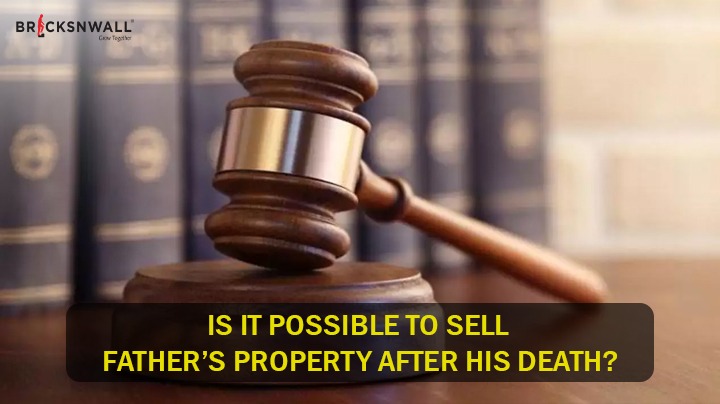Is it possible to sell father’s property after his death?
By Bricksnwall | 2024-06-19

Determining property inheritance following a
person's death is dependent on a number of circumstances, including the
presence of a will, the type of property, and the individual family laws.
Following a father's death, property ownership usually passes to his legal
heirs, which normally include his children, widows, and, on rare occasions,
parents.
Consider the distribution scenarios below:
With a will: If the person has left a will,
property distribution is based on his stated intentions. An executor, who is
often specified in the will, is in charge of ensuring that the named
beneficiaries receive an equitable distribution.
Without a will (intestate):
In the absence of a will, the property is distributed in accordance with the
personal laws of the family.
Hindu Law (Hindu Succession Act, 1956):
If the father practices Hinduism, Jainism, Sikhism, or Buddhism, the property
is distributed to his legal heirs, which include his children (sons and
daughters), widow, and mother, each receiving an equal share.
Muslim Law: In the absence
of a will, property distribution follows Islamic inheritance norms.
Christian Law (Indian Succession Act, 1925): When a Christian dies, the children, wife, and kin inherit their property. The wife and children act as primary heirs, distributing the property in accordance with established criteria.
How long after a father's death does property
transfer occur?
Under the Limitation Act of 1963, legal heirs must file a claim for the property within 90 days of the father's death. However, while the claim must be initiated within this window, the actual settlement and transfer may take many months. The duration is determined by several elements, including the resolution of any disputes, the acquisition of legal documentation, and the completion of administrative procedures.
Is it possible to sell your father's property upon
his death?
Following a father's death, a son or daughter has the right to sell their father's property. However, before the sale can take place, the property must be transferred to the appropriate heir. Once the property is officially owned by the heirs, it can be sold. It is critical that all legal heirs agree to the transaction and sign the necessary documentation. Furthermore, all property records must be updated to appropriately reflect the new ownership before the sale can be completed.
Bricksnwall POV
Following a father's death, the potential of
selling their property becomes a major factor for the heirs. This article
explores the complex legal landscape around this subject, offering insight on
the obligations, rights, and potential obstacles involved. Understanding
inheritance distribution within diverse legal systems, such as Hindu, Muslim,
and Christian laws, clarifies who has the right to inherit the property.
Furthermore, the clarification of procedural factors, such as the necessity of
filing a claim within a specific deadline and the subsequent transfer of
ownership, emphasizes the importance of following legal protocols. While a
father's property can be sold after his death, it must be done within the
confines of legal compliance and with the unanimous permission of all legal
heirs.







